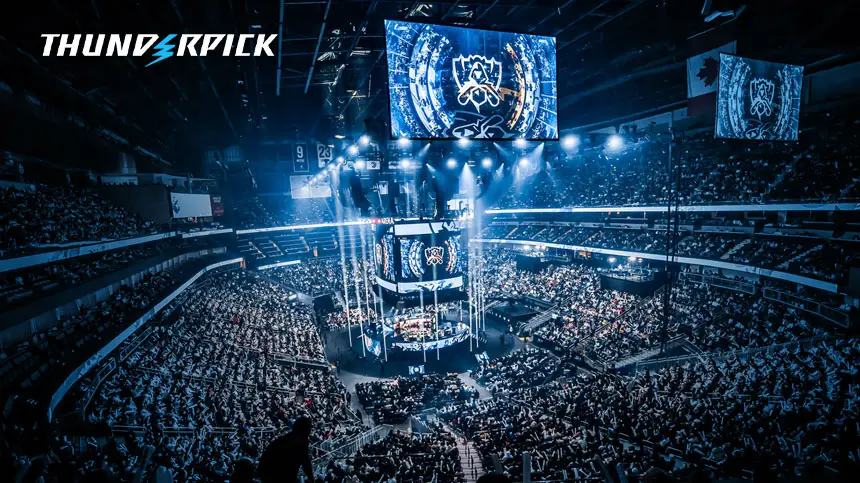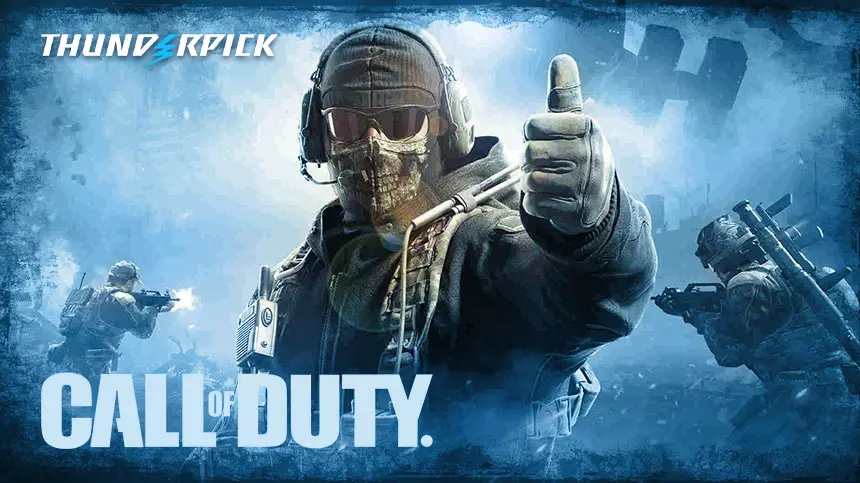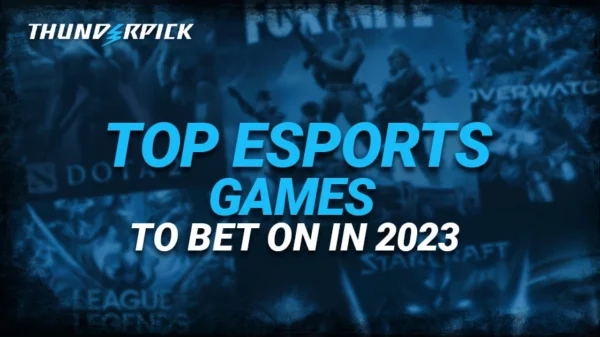Are you looking for the ultimate nexus where the fast-paced world of esports intersects with the excitement of crypto betting? If so, you’ve just struck digital gold! As a platform forged by gamers for gamers, Thunderpick promises to revolutionize your esports crypto betting experience!
It’s more than just finding the top esports games to bet on. It’s about living the game wherever you play, from PlayStation, Xbox, and Nintendo, to PC and mobile. After all, esports is no longer the future — it’s a commanding reality with intense competition and a thriving global community and camaraderie.
Get ready to be thrown into the epicenter of all the electrifying action. Join us as we explore esports’ rich tapestry and the best esports games to stake your crypto right here and now!
What is Esports?
Esports fundamentally represents a collection of competitive games, professionally and recreationally, engaged at organized events or tournaments. This pulsating phenomenon largely encompasses multiplayer games, amped by a vibrant spirit of competition. However, esports has also sprinted to the forefront of mainstream entertainment, which is made clear by its surging viewership and tournament stakes.
A striking example is the Counter-Strike: Global Offensive (CS:GO) IEM Katowice 2022 tournament, which attracted 1.1M spectators at its peak. But it doesn’t stop there. Dota 2’s The International 2021 sported a jaw-dropping $40M prize pool, setting a new precedent.
Such monumental growth has sparked fervent discussions about the legitimacy of esports as a recognized sport, which was, for the longest time, met with skepticism due to its non-physical nature. But the tide seems to be shifting favorably.
One optimistic sign is the inclusion of Fortnite, the battle royale game by Epic Games, in the Olympic Esports Series 2023. The title joins a roster of virtual variants of traditional sports, validating esports’ burgeoning standing in the sporting world.
Esports History
Although the esports narrative is evolving at a breakneck pace and filled with much promise, let’s rewind and retrace the journey that brought us here. Of course, the esports tradition has an extensive history, with its roots extending as far as the early 1970s — roughly the same time consoles became popular.
One notable inaugural esports event was the Space Invaders Championship organized by Atari in 1980. This tournament drew the attention of more than 10,000 spectators, hinting at the explosive growth competitive gaming would experience in the subsequent decades. However, the actual popularization of esports events didn’t kick off until the ‘90s.
While these initial tournaments were modest compared to today’s grandiose global championships, they marked a significant starting point. Legendary game franchises like Doom, StarCraft, Quake, and Street Fighter laid the groundwork alongside the rapid advancement of high-speed broadband internet.
Fast forward to the 2010s, when the esports landscape saw astonishing growth, drawing larger audiences and boasting bigger prize pools. Despite considerable progress in the preceding years, esports tournaments truly proliferated with the emergence of events like the Intel Extreme Masters (IEM), Major League Gaming (MLG), and World Cyber Games.

How is a Game Classified as Esports?
It’s important to clarify that not all video games earn the “esports” title. The key criterion is a robust competitive and multiplayer facet. The core of esports rests on the player-versus-player element, often leaving single-player games out of the esports scene.
Perhaps more importantly: esports games also demand skill, and not luck, which is why they draw parallels to traditional sports. These skills range from strategic decision-making and rapid reaction times to the ability to collaborate effectively (teamwork).
Lastly, a game’s ascension to an esports title requires a thriving, structured competitive scene. This includes a ranking system, a leaderboard, and the ever-crucial aspect of spectatorship. In short, the more views the game receives, the greater its acceptance as a reputable form of competition.
Biggest Esports Games by Viewership
Diving into the vast world of esports, let’s spotlight the five top esports games by total viewership. This data, sourced from the reputable statistics site Esports Charts, showcases the games that truly resonate with fans.
1. Free Fire
Garena’s renowned battle royale game, Free Fire, holds the crown for the most-viewed esports game. The Free Fire World Series 2021: Finals in Singapore garnered a staggering 5.4M peak views and an average of 2.1M spectators during its 9-hour broadcast. Don’t forget to check out our blog where we compare Free Fire vs PUBG Mobile.

2. League of Legends
League of Legends (LoL) by Riot Games clinches the second spot with more than 5.1M views at the 2022 World Championship grand finale between T1 and DRX. The tournament enjoyed an average viewership of roughly 1M across its duration.
Place your League of Legends bets!
3. Mobile Legends: Bang Bang
Securing third place is the Mobile Legends: Bang Bang M4 World Championship. Held in January 2023, the event attracted a peak of 4.3M viewers and maintained an average of about 807K spectators throughout its nearly 100-hour run.
Place your Mobile: Legends: Bang Bang bets!
4. PUBG: Mobile
PUBG: Mobile Global Championship (PMGC): Season 0 championship series takes fourth place, peaking at 3.8M spectators on Day 1 of the Finals. An average of 530K viewers tuned in throughout the event held in January 2021.
5. Counter-Strike: Global Offensive
Holding fifth place for the biggest esports game by all-time viewership is CS:GO. The PGL Major Stockholm 2021 drew a peak of 2.7M viewers during the Champions Stage Day 4 clash between G2 Esports and Natus Vincere. On average, the event attracted 600K views during its 120-hour broadcast.
Place your CS:GO bets!
Most Common Esports Game Modes
Esports represents a vibrant mosaic of games, each brandishing an impressive fan and player base. This is a lush universe that transcends multiple genres and video games, offering diverse competitive experiences.
MOBA
Multiplayer online battle arena (MOBA) games like Dota 2 (Valve) and League of Legends (Riot Games) are some of the most popular esports games. The level of competition and strategic complexity that these games offer to the global esports scene is demonstrated through The International and Worlds Championship tournaments.
First-Person Shooter
The list of notable first-person shooter games (FPS) includes Call of Duty (Activision), CS:GO (Valve), Valorant (Riot Games), and Overwatch (Blizzard Entertainment). Together, these titles boast exhilarating spectatorship and high-stakes competition, representing an indomitable genre in the esports realm.

Fighting Games
Fighting games hold a distinctive position in esports lore, tracing their roots back to the “golden age” of competitive gaming. These games were pioneered by Street Fighter II (Capcom), which introduced the world to player-versus-player tournaments in the early ’90s.
This ultimately led to iconic events like the Evolution Championship Series (EVO). Today, franchises such as Tekken and Super Smash Bros. continue this legacy, capturing spectators’ hearts in numerous fighting-focused esports tournaments.
RTS
Notable real-time strategy (RTS) games include StarCraft II and Warcraft III: Reign of Chaos (Blizzard Entertainment), as well as Age of Empires (Microsoft), each putting rapid decision-making and strategic prowess to the test.
A fascinating piece of trivia: Around 2003, a player named Icefrog fashioned a mod in the Warcraft III world editor, “Defense of the Ancients” (DotA), which became the foundation for the acclaimed MOBA title Dota 2.
Sports Games
Sports titles such as the NBA 2K (Take-Two Interactive) and FIFA (Electronic Arts Sports) franchises, along with Rocket League (Psyonix), are prime examples of popular games that command global fan admiration. The Rocket League Championship Series in 2023, for example, recorded around 10m hours of viewership together with over $2m in prize money.
Merging the passion for traditional sports with the thrill of competitive gaming, these games highlight the striking parallels between esports and their real-world counterparts.
Battle Royale Game Modes
The Battle Royale genre is characterized by its survival gameplay, and it took the world by storm. Games like Call of Duty: Warzone (Activision), Fortnite (Epic Games), and PUBG (Krafton) offer thrilling, high-stakes multiplayer matches that attract millions of viewers during esports events.
Mobile Esports Games
Mobile esports games have democratized esports, bringing competitive gaming to the pockets of players worldwide. Mobile Legends: Bang Bang (Moonton), Clash Royale (Supercell), and Free Fire (Garena) offer complex gameplay and competitive scenes.
Accessibility and convenience make this genre attractive to a broad range of players, contributing to the massive growth and expansion of the esports industry. And then there’s the advancement of 5G technology, which will only make mobile games more available and enjoyable around the world.
Why Do People Gamble on Esports?
Just like traditional gambling, esports betting captivates audiences worldwide, offering a thrilling blend of adrenaline and strategic play. Yet the lure of substantial financial rewards remains unrivaled.
Imagine the excitement of accurately naming the winner in a riveting esports showdown and pocketing a tidy sum as a result. It’s an enticing prospect that takes the excitement to a whole new level. However, the thrill of esports betting doesn’t stop at winning money.
Many enthusiasts are drawn by the exhilarating spirit of competition, pitting their predictive prowess against other fans. This interactive challenge introduces another layer of enjoyment and anticipation.
Esports matches are also inherently unpredictable, so there’s a constant stream of “Wait, what just happened!” moments that keep the betting landscape exciting and dynamic.
Check out the upcoming esports games for the latest action!
Esports FAQs
Phew! We’ve covered quite a lot! But if you’re still hungry to know a bit more, we’ve got your back. You’ll find a few frequently asked questions (FAQ) about esports below, which we hope will shed some light on anything you’re wondering about.
What Are Esports Games?
Esports games are competitive multiplayer games played professionally and recreationally at organized events or tournaments. They offer diverse competitive game modes, including solo, team, and battle royale formats, and usually a prize pool of some sort.
The most important component for a video game to earn the “esports” title is its competitive nature and multiplayer element, emphasizing skill over luck.
What Kind of Games Are Played in Esports?
There are many different types of games played in esports, each requiring a varying degree of gaming experience and skill to become proficient. We’ve already mentioned quite a few examples, but the most popular esports games belong to the MOBA and FPS genres.
Which Are the Most Viewed Esports Games?
Game popularity correlates with viewership, which changes yearly or even monthly depending on updates, events, and new title releases. As of 2023, some of the most viewed esports games are Mobile Legends: Bang Bang, LoL, CS:GO, Valorant, PUBG: Mobile, Apex Legends, and Dota 2.
Noteworthy streaming platforms like Twitch allow fans to watch in-game action and gameplay, contributing significantly to the games’ viewership numbers.
